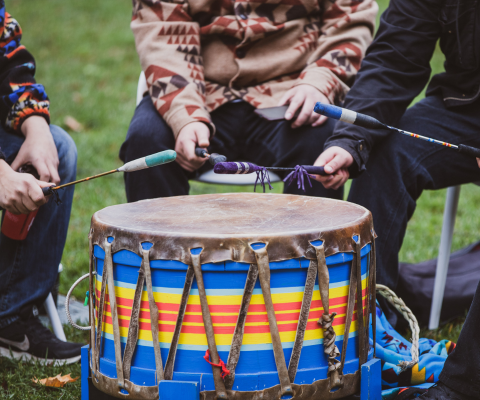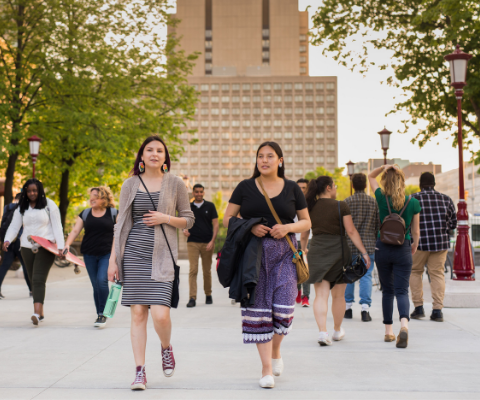Universities Canada’s commitments to truth and reconciliation

Universities Canada and its member institutions are located on Indigenous lands home to diverse First Nations, Inuit and Métis Peoples. Universities recognize the self-determination of Indigenous Peoples and strive to affirm and respect inherent and Indigenous rights and the treaties that govern these lands. Relationships with Indigenous Peoples are an important source of strength and knowledge that make universities in Canada unique in the world.
Universities Canada is a membership association that supports the presidents of over 90 public and non-profit universities in Canada. We advocate to the federal government on behalf of universities and convene university presidents to discuss issues of importance to their institutions. University education for Indigenous students and advancing reconciliation with Indigenous Peoples at universities in Canada are core priorities for our member institutions and our organization.
Universities recognize their responsibility in reconciliation, in creating respectful partnerships with First Nations, Inuit and Métis Peoples, in breaking down the barriers to university education faced by Indigenous students, in providing equitable employment opportunities for Indigenous faculty and staff, and centering the needs of Indigenous Peoples in teaching and research. The commitments below constitute a living document, now titled Commitments to Truth and Reconciliation, that serves to update the Principles on Indigenous Education first adopted by Universities Canada members in 2015.
The commitments seek to respond to the evolving context of truth and reconciliation in Canada and serve as a forward-looking document to guide and support the work of universities. The development of the commitments has been informed by consultations with Universities Canada’s advisory group on Indigenous higher education, Indigenous leaders across universities, and Indigenous communities and organizations, and these groups and individuals, as well as others, will continue to be engaged as the commitments evolve.
Actualizing the Commitments to Truth and Reconciliation will be an ongoing effort of Canadian universities for years to come, and the commitments serve as one tool to guide Canadian universities in this work. In addition to these commitments of our members, Universities Canada commits to supporting members in their work through convening dialogues of university leaders, sharing best practices, and advocating for more resources for Indigenous students and researchers. Universities Canada also commits to supporting distinct but complementary work to advance equity, diversity and inclusion, recognizing intersectionality of Indigenous identities. Universities Canada commits to supporting the commitments below in coordination with the association’s other Principles including the Inclusive Excellence Principles, Social Impact Principles and Institutional Autonomy Principles.
Commitments
The commitments below are in no particular order, and each is considered of equal priority in this document.
Policies, strategic plans and governance
Universities commit to advancing truth as a step toward reconciliation. This includes acknowledging their role in colonialism and the legacy of residential schools in education in Canada. Universities affirm their commitment to supporting the implementation of the Truth and Reconciliation Calls to Action; Calls for Justice from the National Inquiry into Missing and Murdered Indigenous Women, Girls and 2SLGBTQQIA people; the United Nations Declaration on the Rights of Indigenous Peoples; the recommendations of the Royal Commission on Aboriginal Peoples; and provincial commissions and reports regarding Indigenous peoples and their rights.
Universities commit to developing opportunities for Indigenous students, faculty, researchers, staff and leaders at every level of the institution through governance structures, policies, and strategies that respect and make space for Indigenous expertise, Knowledges and cultures.
Universities acknowledge systemic anti-Indigenous racism and oppression and commit to building welcoming and respectful campus environments through things such as the implementation of mechanisms to address racism and racist incidents, as well as academic programs, services, supports and spaces dedicated to Indigenous students, faculty and staff.
Indigenous student success
Universities commit to a strengths-based, student-centered approach to promoting Indigenous student success including a focus on the learners, learning outcomes and learning abilities, holistic student supports including personal, academic and cultural supports, as well as supporting the Indigenous staff and faculty who act as champions and role models for Indigenous students.
Teaching and learning
Universities commit to supporting the Indigenization of curricula through things such as responsive academic programming, support programs, orientations, and pedagogies and to making room for Indigenous Knowledges and ways of knowing throughout diverse fields of study, including opportunities for Elders and Knowledge Keepers in university structures.
Universities commit to supporting resurgence of Indigenous languages through things such as working with First Nations, Inuit and Métis Peoples, Elders, and Knowledge Keepers to offer accessible language courses and programs.
Research
Universities commit to developing research partnerships with First Nations, Inuit and Métis communities, post-secondary institutions and organizations that centre Indigenous needs through respectful, mutually beneficial, and collaborative relationships and appropriate protocols throughout the research process.
Community engagement
Universities commit to developing reciprocal relationships of accountability with the First Nations, Métis and Inuit communities and organizations they serve, in the spirit of co-creation, to ensure programming and resources meet Indigenous needs, promote partnerships with Indigenous post-secondary institutions, and facilitate outreach to Indigenous youth and prospective students.
Universities commit to developing accessible community-based learning opportunities that serve the needs identified by First Nations, Inuit and Métis Peoples and allow students to remain connected with their families, communities, and cultures.
Supporting people
Universities commit to supporting Indigenous-led resurgence and revitalization and to improving representation of Indigenous talent at the governance level and among faculty, professional and administrative staff. Acknowledging the additional stressors and duties often asked of Indigenous faculty and staff, universities commit to providing supports, resources and recognition to ensure the advancement and retention of those staff.
Universities commit to ensuring that non-Indigenous students, faculty, staff and leadership have the training and resources they need to uphold their responsibility to work towards reconciliation and decolonization across their institutions.
Tagged: Indigenous education




